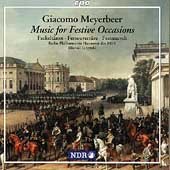| All Artists: Giacomo Meyerbeer, Michail Jurowski, NDR Philharmonic Orchestra (Hannover), Radio-Philharmonie Hannover des NDR Title: Meyerbeer: Music for Festive Occasions Members Wishing: 0 Total Copies: 0 Label: CPO Release Date: 6/2/1998 Genres: Jazz, Special Interest, Classical Styles: Swing Jazz, Marches, Opera & Classical Vocal, Symphonies Number of Discs: 1 SwapaCD Credits: 1 UPC: 761203916825 |
Search - Giacomo Meyerbeer, Michail Jurowski, NDR Philharmonic Orchestra (Hannover) :: Meyerbeer: Music for Festive Occasions
 | Giacomo Meyerbeer, Michail Jurowski, NDR Philharmonic Orchestra (Hannover) Meyerbeer: Music for Festive Occasions Genres: Jazz, Special Interest, Classical
|
Larger Image |
CD Details |
CD ReviewsSpectacular! Adam Kubik | Buffalo, NY USA | 09/21/2000 (5 out of 5 stars) "Jakob Beer (or Giacomo Meyerbeer as he let himself be known in Paris) is probably the best composer no one knows about. He was primarily an opera composer, but his works, though immensely popular in their time, have been overshadowed in the ensuing decades by those of Richard Wagner and Giuseppi Verdi. This disc contains some of Meyerbeer's occassional pieces, which are even more unknown than his operas; the latter having at least attained some notoriety through the acrimonious (and personal) debate which tends to swirl around them in the academic literature. Whatever the merits of his operas, these marches (as all 7 pieces on this disc are) are all spectacular! The first was composed as the "German" contribution to the musical festivities at the London World Exhibition (1862) and is in 4 parts: a "triumphal march," a "religious march," a dance movement, and finally an arrangement of the theme "Rule Britannia" as befitted the occasion. In his Parisian grand operas Meyerbeer was famous for his use of strong dramatic and musical contrasts: antagonistic principles in close proximity. This piece provides his audience with the flavor of one of those works "in miniature" and sans voice. The first and last sections are bombastic, but are set off nicely by a soft second section, gorgeously scored for light wind and strings and a beautiful percussive accompaniment, as well as the lively dance section. The second work, composed for celebrations surrounding the 100th anniversary of Schiller's birth (1859), is notable for an extended all-brass middle section of great charm. The third track is a march from his opera Le Prophete and probably the best-known of his works (though this perhaps is not saying much). Though short it as also well-conceived. The music alternates between the agressive "coronation march" theme proper, and a memorable more lyrical theme with a sumptuous horn accompaniment, that you will find yourself humming hours later.The last four tracks are all marches for the weddings of three Prussian princesses and the crown prince (Marie [1844], Charlotte [1850], Anna [1856], Frederick William [1858]). They are all written in rondo style: the march theme recurs periodically surrounding other themes of a freer style. The last ends with a redition of "God Save the King," (perhaps better known to Americans as "My country 'tis of thee") to honor Prince Frederick's new wife, Princess Victoria of England. All the marches show tremendous ingenuity in their orchestration, are possessed of charming melodic material, and are extraordinarily original and varied considering their genre. I reccommend this recording highly to virtually any classical music lover."
|

 Track Listings (7) - Disc #1
Track Listings (7) - Disc #1